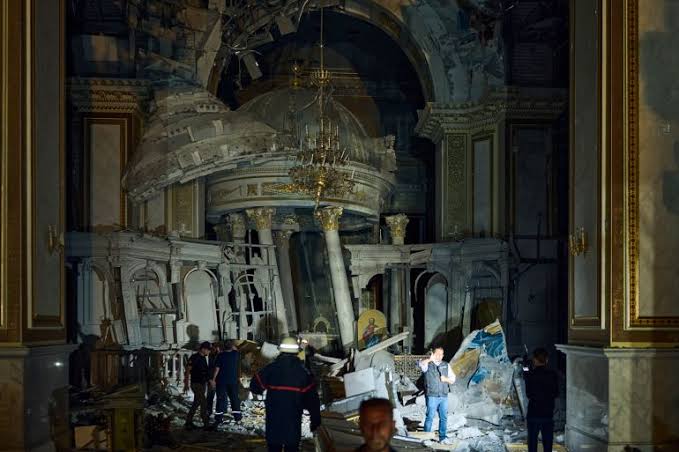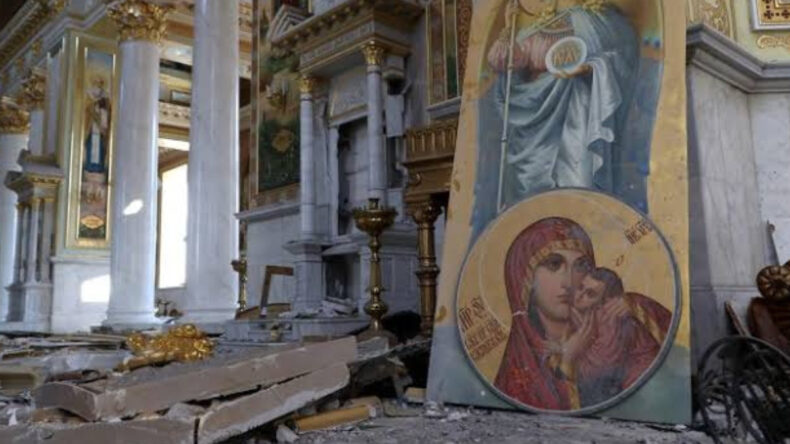
Russian missile strikes have had a tragic impact on Ukrainian cultural heritage, resulting in extensive destruction in the southern port city of Odesa. The aftermath of the strikes has left the city’s cultural treasures in ruins, prompting widespread sorrow and distress. Among the targets was the historic Cathedral, a revered architectural gem that bore witness to the city’s rich history. As the dust settles, the toll of the attacks becomes painfully clear, with at least one person killed and numerous architectural landmarks reduced to rubble.
The missile strikes on Odesa represent a disturbing escalation in the ongoing conflict between Russia and Ukraine. The attacks, the latest in a series targeting the city, have caused substantial loss to Ukraine’s cultural heritage and sparked outrage across the nation. At least 25 architectural monuments, including the Cathedral, were devastated, drawing strong reactions from Ukrainian officials and international leaders.
President Volodymyr Zelensky vowed retaliation in the face of this tragic loss, condemning the deliberate targeting of Odesa’s historic city centre, which holds UNESCO protection. The destruction of culturally significant landmarks has left the nation mourning the loss of its tangible past.
Among the cultural treasures that fell victim to the strikes were the House of Scientists and Zhvanetskyi Boulevard, further amplifying the sense of grief and loss in the city. Many historic mansions also succumbed to the onslaught of destruction.
The Transfiguration Cathedral, the largest church building in Odesa, holds deep historical and religious significance. Consecrated in 1809, it endured destruction during the Soviet era in 1936, only to be meticulously reconstructed when Ukraine gained independence.
As the cathedral lies within Odesa’s city centre, which UNESCO designated as a World Heritage Site due to the looming threat of Russia’s invasion, the attacks on these landmarks resonate on a global scale. The visual evidence of the devastation, captured in videos and images, paints a heartbreaking picture of destruction and loss.
Ukraine’s Minister of Culture, Oleksandr Tkachenko, demanded Russia’s expulsion from UNESCO, accusing Moscow of endangering both civilians and world heritage property. This stance was echoed by Moldovan President Maia Sandu, who expressed anguish over the attacks on Odesa and condemned Russia’s continued air assaults on peaceful cities.
The attacks have taken a toll on the city’s infrastructure and its inhabitants. The Ukrainian Operational Command reported extensive damage to vehicles and buildings, with power outages and disruptions to public transport adding to the residents’ hardship.

Amidst the chaos, Ukrainian journalist Julia Gorodetska found herself caught up in the overnight attacks. Her firsthand account reflected the terrifying nature of the bombings and the profound impact they had on the lives of civilians. The scenes of destruction left an indelible mark on her memory and heightened her resolve to seek a future free from such violence.
The strikes have exposed Ukraine’s struggle to repel the onslaught of Russian attacks on Odesa. The limitations of its air defences in dealing with the sophisticated missile weaponry employed by Moscow have led to devastating consequences.
In response to the crisis, Ukrainian President Zelensky strongly condemned the Moscow attacks and asserted the nation’s determination to retaliate against Russia. The European Union’s foreign policy chief, Josep Borrell, took to Twitter to denounce Russia’s attempts to damage hundreds of cultural sites and undermine Ukraine’s cultural heritage.
The attacks in the Kharkiv region, which resulted in civilian casualties, added to the sense of tragedy unfolding across Ukraine. Local military commanders reported the deaths of two individuals, including a 57-year-old woman and a 45-year-old man, in the Dvorichna district.
As the dust settles and the nation mourns its losses, the world looks on with a mix of horror and concern. The attacks on Odesa’s historic landmarks have not only damaged Ukraine’s tangible heritage but also struck at the heart of its cultural identity. As the nation seeks to rebuild and heal, the consequences of these devastating strikes will reverberate for years to come.












